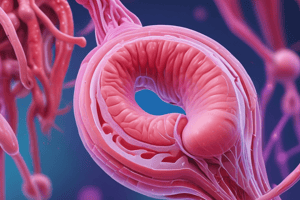Podcast
Questions and Answers
What is the recommended first line treatment for Struvite uroliths?
What is the recommended first line treatment for Struvite uroliths?
- Minimally invasive removal
- Struvite dissolution (correct)
- Urinary diet
- Surgical removal
What is the recommended monitoring interval for radiographs after initiating treatment for Struvite uroliths?
What is the recommended monitoring interval for radiographs after initiating treatment for Struvite uroliths?
- Every 4 weeks (correct)
- Every 2 weeks
- Every 6 weeks
- Every 8 weeks
In which type of urine do Calcium Oxalate uroliths typically form?
In which type of urine do Calcium Oxalate uroliths typically form?
- Acidic urine (pH < 6.5) (correct)
- Alkaline urine (pH > 7.0)
- Neutral urine (pH 7.0)
- Slightly acidic urine (pH 6.5 - 7.0)
Which breed is NOT commonly associated with Calcium Oxalate uroliths?
Which breed is NOT commonly associated with Calcium Oxalate uroliths?
What is recommended for prevention of urolithiasis?
What is recommended for prevention of urolithiasis?
Which diets are specifically recommended for Struvite/CaOx uroliths prevention?
Which diets are specifically recommended for Struvite/CaOx uroliths prevention?
What does monitoring for urolithiasis involve?
What does monitoring for urolithiasis involve?
Which patient populations are mentioned in the text?
Which patient populations are mentioned in the text?
What are some types of uroliths mentioned in the text?
What are some types of uroliths mentioned in the text?
What can be attempted in dogs with uroliths prior to minimally-invasive/surgical management?
What can be attempted in dogs with uroliths prior to minimally-invasive/surgical management?
How are Nephroliths and Ureteroliths treated?
How are Nephroliths and Ureteroliths treated?
How may non-obstructive and non-infected stones be managed?
How may non-obstructive and non-infected stones be managed?
What complications may occur during healing?
What complications may occur during healing?
What treatment option may be considered for ureteroliths?
What treatment option may be considered for ureteroliths?
What are the references for urolithiasis management mentioned in the text?
What are the references for urolithiasis management mentioned in the text?
Flashcards are hidden until you start studying
Study Notes
Canine and Feline Urolithiasis Management
- Prevention strategies include increasing water consumption and high moisture diets
- Specific prevention diets for Struvite/CaOx uroliths include Hill’s c/d Multicare, Metabolic + Urinary, Multicare Stress, Purina UR, St/Ox Urinary, and Royal Canine Urinary SO, Moderate Calorie
- Monitoring involves checking urine specific gravity (USG), pH, and crystalluria
- Two distinct patient populations include those with hepatic dysfunction and dogs with genetic defects of uric acid transporter (SLC2A9)
- Urolith types include Calcium Oxalate, Urates, Cystine, Xanthine, and others
- Medical dissolution can be attempted in dogs with uroliths prior to minimally-invasive/surgical management
- Specific treatment options and diets are recommended for each urolith type
- Nephroliths and Ureteroliths are treated based on the type of stone and can require invasive procedures
- Non-obstructive and non-infected stones may be managed with benign neglect
- Healing complications may occur, and the use of a subcutaneous ureteral bypass system may be considered
- Ureterolith treatment options include ureterotomy
- References for urolithiasis management include textbooks and consensus recommendations from experts
Studying That Suits You
Use AI to generate personalized quizzes and flashcards to suit your learning preferences.



